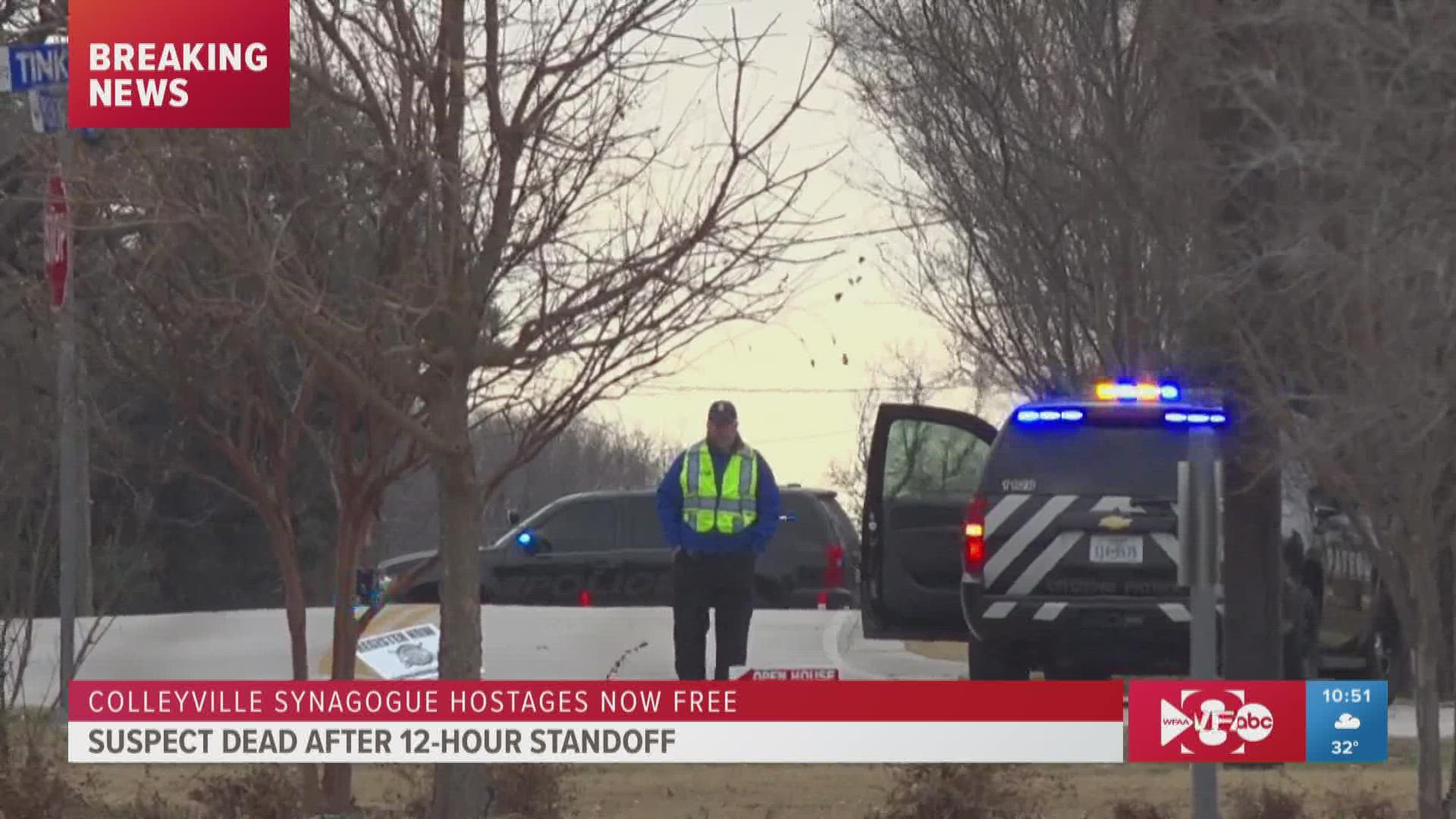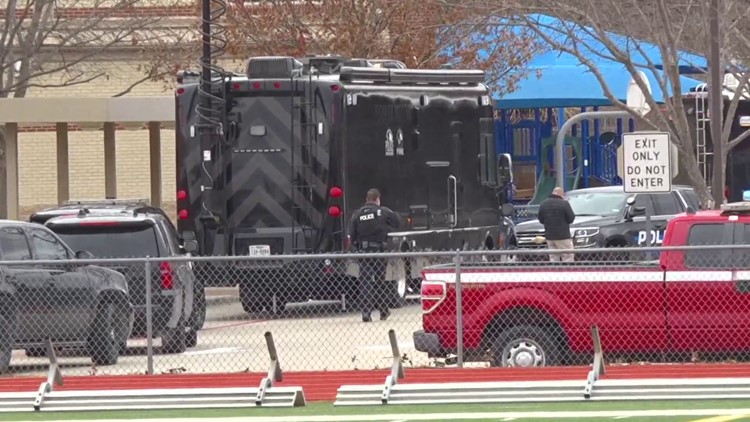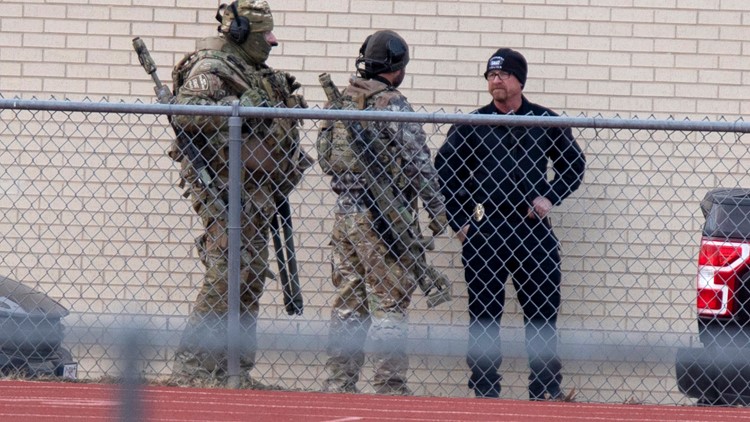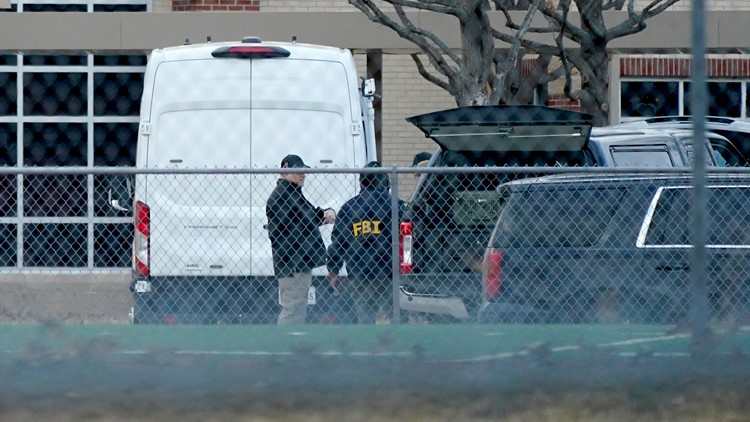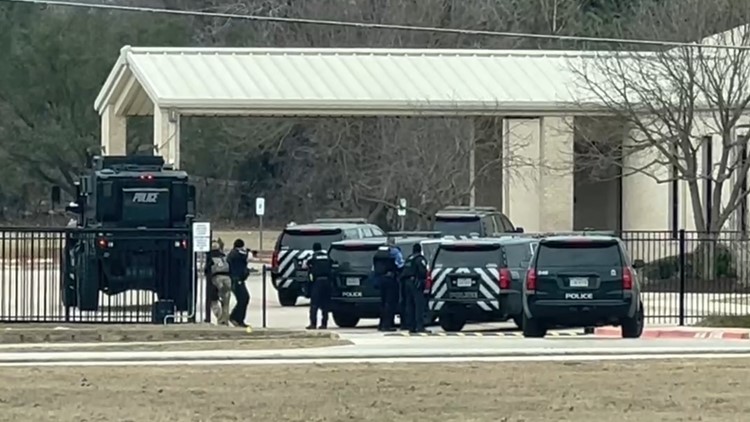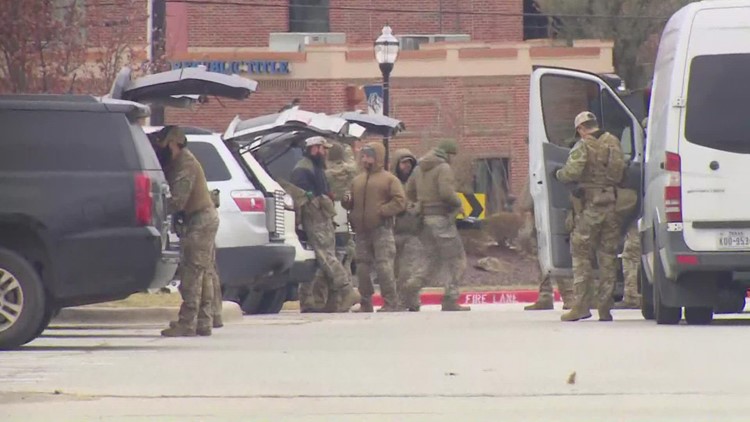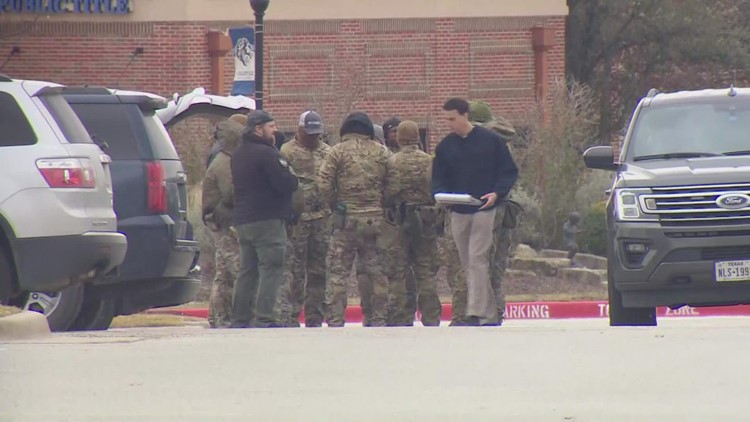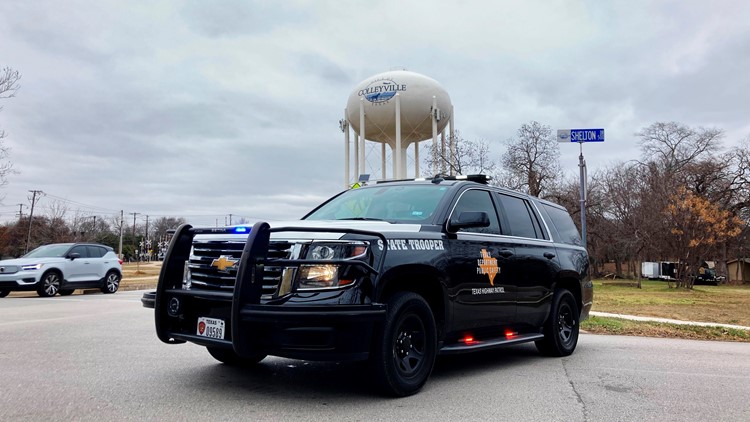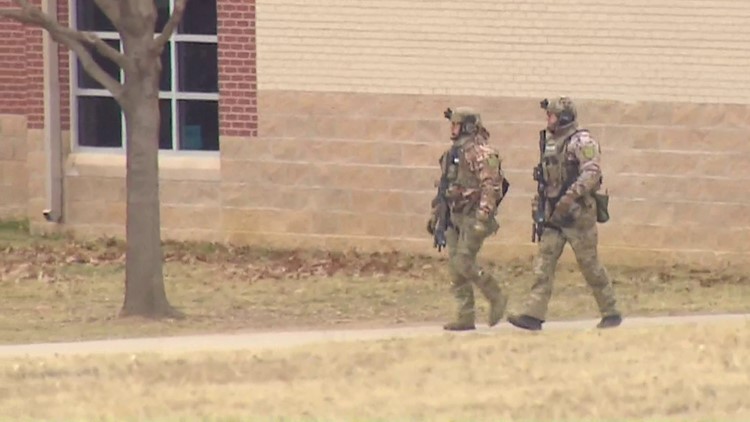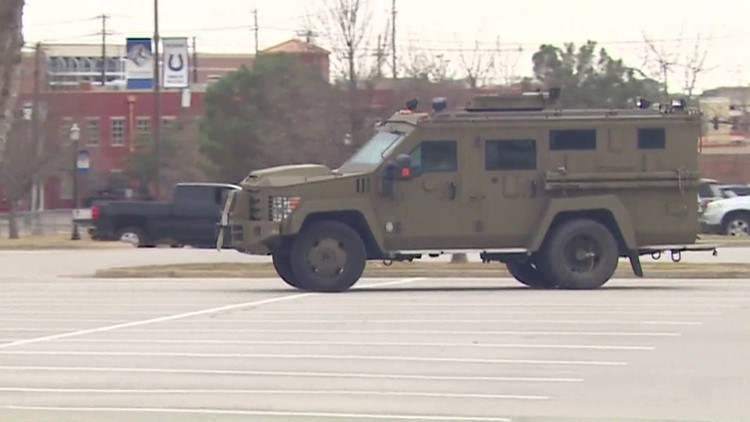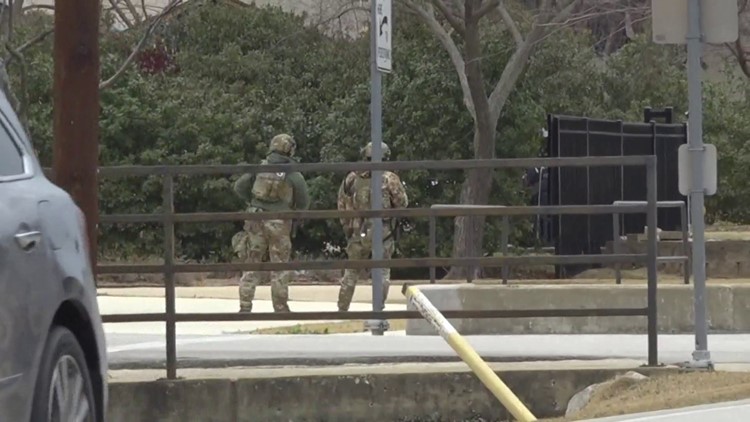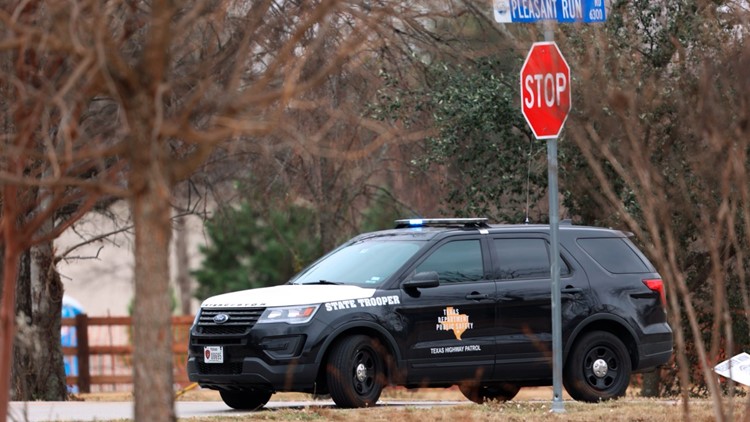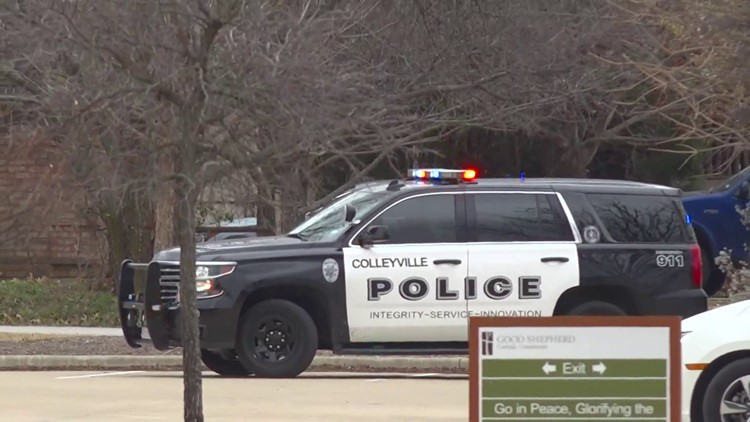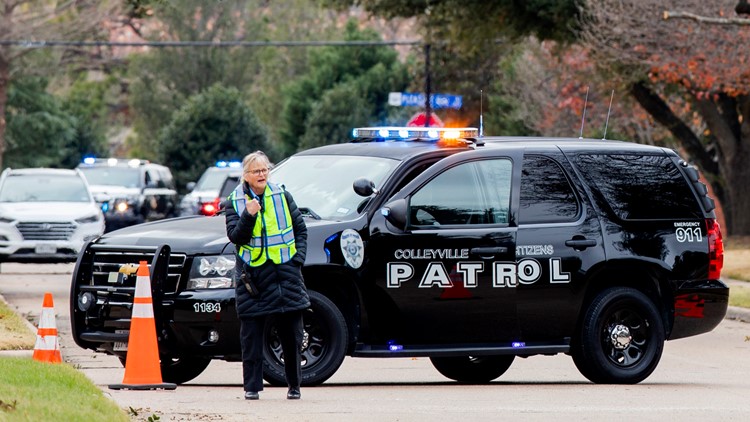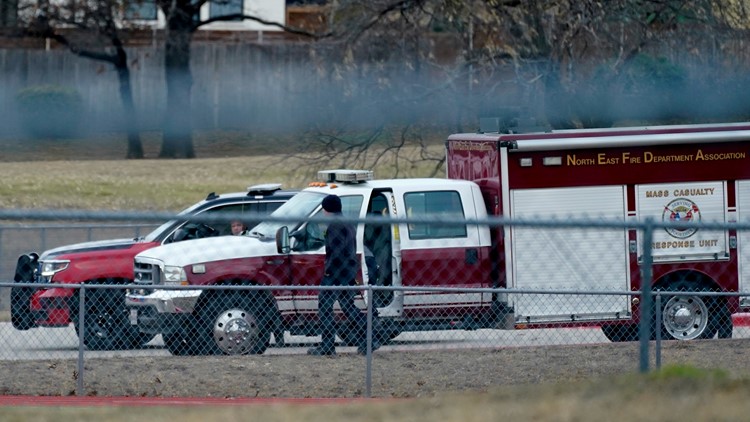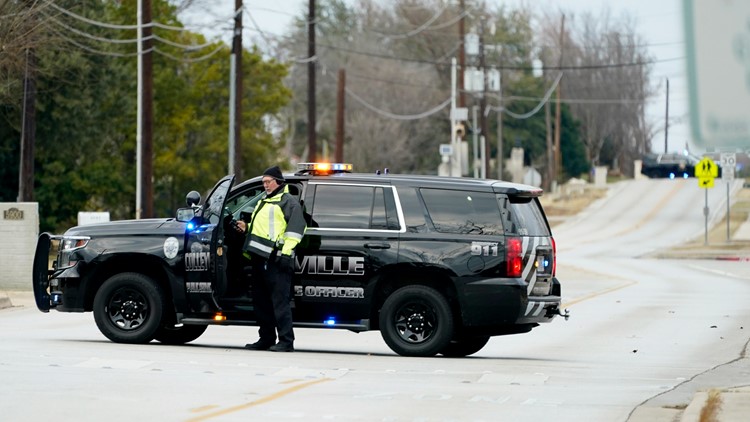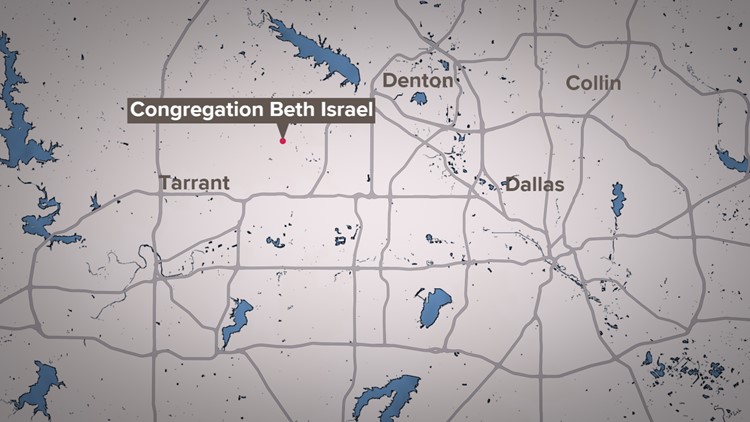COLLEYVILLE, Texas — A nearly 12-hour standoff at Congregation Beth Israel synagogue in Colleyville on Saturday ended with four hostages escaping unharmed and a suspect dead, authorities said.
The result was the culmination of all-day efforts from law enforcement to negotiate with a reportedly armed British national named Malik Faisal Akram, 44, inside the Congregation Beth Israel synagogue. It is unclear how Akram died, as officials have not released further information.
While a resolution was reached Saturday night, the investigation into what happened, and why, continues -- and likely will for some time.
As of Monday, Jan. 17, here's what we know.
How did the hostage situation unfold at Congregation Beth Israel?
SWAT officers with the Colleyville Police Department, as well as officials with the Texas Department of Public Safety and FBI, initially responded at 10:40 a.m. to the scene in the 6100 block of Pleasant Run Road near Tinker Road and State Highway 121 in Colleyville.
Police soon evacuated residents near the immediate area of the synagogue within the Dallas suburb, located 16 miles northeast of Fort Worth.
As the hostage situation unfolded, a Facebook Live stream from the synagogue was airing a fixed-camera shot, showing the pulpit. The faint voice of a man, presumed to be the hostage-taker Akram, could be heard in the background, but the footage did not show any other activity. The stream was cut shortly before 2 p.m., but the hostage situation continued as FBI crisis negotiators stayed in constant contact with Akram throughout the day.
Around 5 p.m., one male hostage was released. According to police, that man, who hasn't yet been identified, was reunited with his family.
Citing sources familiar with the ongoing situation, both ABC News and the Associated Press reported that Akram was armed.
How did the hostage situation end?
As the standoff dragged on into the nighttime hours, Colleyville Police Chief Michael Miller said that the FBI called in a special rescue team to help bring the situation to a close.
"The FBI called out the hostage rescue team, which is an elite hostage rescue force out of Quantico, Virginia," Miller said. "They immediately got on a plane and flew down here. I think they brought 60 or 70 people from Washington, D.C. to come and help with the situation."
The hostage rescue team then "breached the synagogue" and rescued the three remaining hostages, Miller added. Among them was believed to be the synagogue's rabbi, Charlie Cytron-Walker.
Dramatic video from WFAA showed the three hostages escaping the building:
Who is the Colleyville hostage-taker?
On Sunday, special agent in charge Matthew DeSarno of the FBI Dallas Field Office confirmed the identity of the Colleyville, Texas, hostage taker as 44-year-old British citizen Malik Faisal Akram.
Law enforcement sources confirmed to WFAA that Akram arrived in the U.S. at John F. Kennedy International Airport in New York on Dec. 29, 2021 and that he had listed a Queens hotel on a customs form as his local address. It's unclear if Akram stayed at the hotel before going to Texas.

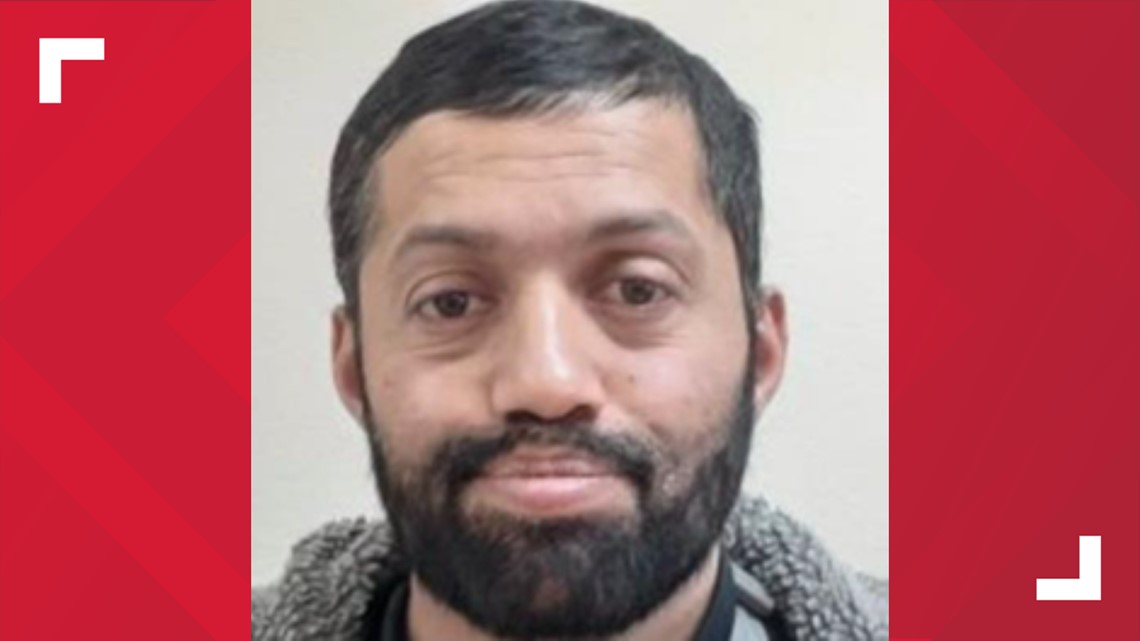
Multiple sources said Akram was demanding throughout Saturday's incident to speak to Aafia Siddiqui, a Pakistani neuroscientist suspected of having ties to al-Qaida. A connection between Siddiqui and Akram is not yet clear.
Initially, law enforcement did not confirm a motive for Akram during their news conference, and said that it appeared the incident was not targeted toward the Jewish community.
However, subsequent messaging from a joint intelligence bulletin from the FBI, the Department of Justice and the National Counterterrorism Center suggested that the attack "underscores the enduring nature of violent threats posed to Jewish communities from terrorists and perpetrators of hate crimes."
How long had the hostage-taker been in North Texas?
It's still unclear when Akram arrived in North Texas and how long he had been in the area since he came to the U.S., according to sources.
OurCalling, a homeless shelter in Dallas, confirmed that Akram stayed the night at the shelter on Jan. 2, 2022, when temperatures were below-freezing.
In a statement, the center said, in part, Akram "came to OurCalling at 10:01 p.m. that night, presenting as a homeless individual in need of shelter. He spent that night at OurCalling and departed the next day."
The center also said it shared security video and photos from that night with the FBI.
An official with Union Gospel Mission in Dallas told WFAA that Akram went to this homeless shelter on Jan. 6 and left a day later. The official then said Akram came back on Jan. 11 and left the day after.
WFAA was also able to confirm that Akram visited the Islamic Center of Irving, though leaders there said he appeared to be "emotionally unstable."
Has anyone else been arrested in the hostage situation?
Yes.
As the investigation into the hostage situation at a Colleyville synagogue continued Sunday, there have been two arrests in connection to the incident that garnered international attention.
In a statement just before 5:30 p.m. CT on Sunday, the Greater Manchester Police Department said the Counter Terrorism Policing North West group arrested two teenagers in connection to the North Texas incident.
The department said the two teenagers were taken into custody and were being questioned. However, they were later released.
Who is Aafia Siddiqui?
Siddiqui, who was born in Pakistan in 1972, is serving an 86-year prison sentence at the Carswell Federal Medical Center prison in Fort Worth. She was convicted in 2010 on charges of trying to kill American service members in Afghanistan.
Before her arrest, she was accused of being an al-Qaida operative.
According to authorities, Siddiqui held in her possession at the time of her arrest handwritten notes referring to a “mass casualty attack” that listed various locations in the U.S., including Plum Island, the Empire State Building, the Statue of Liberty, Wall Street and the Brooklyn Bridge. The notes also referred to the construction of “dirty bombs,” chemical and biological weapons and other explosives.
Siddiqui had also spent time in the United States as a student, first enrolling at the University of Houston in 1990 and later transferring to MIT in Boston.
Read WFAA's full story on Siddiqui's background:
Why did the hostage-taker mention Siddiqui?
It's still unclear why, exactly, Akram mentioned Siddiqui during the incident -- or if there is any direct connection between the two.
During a news conference Saturday evening, Matthew DeSarno of FBI Dallas said he was unable to release information on the suspect, any possible motives or any demands made, as theirs is still an active and ongoing investigation.
Who were the hostages at Congregation Beth Israel?
Authorities have not identified the hostages at the synagogue, though friends of the rabbi, Charlie Cytron-Walker, told WFAA that they believed he was among the four inside. The other three hostages have not been identified.
All four hostages safely escaped and were not injured.
According to a biography on the synagogue's website, Cytron-Walker has been rabbi there since 2006 and is from Lansing, Michigan.
Shahzad Mahmud told WFAA he's known Cytron-Walker for five to six years and that the rabbi is known for promoting interfaith peace and conversation.
U.S. Rep. Marc Veasey, whose district covers a large part of the Dallas-Fort Worth area, also told WFAA that he has a close relationship with Cytron-Walker and his family.
"I know the rabbi, I know his wife very well. Our kids used to play together when they were young on Saturdays at playdates. So, a really great family," Veasey said. "Really praying this is resolved peacefully. Charlie's a great guy, really down-to-earth guy. His wife works at the Multi-Cultural Alliance, which is an organization that works to bring people of different faiths together."
How did other North Texas cities respond to the hostage situation?
The hostage situation at Congregation Beth Israel sent ripples across North Texas, and the country.
Both Dallas and Fort Worth police were stepping up their patrols at city synagogues on Saturday, out of precaution. Rockwall police were also in contact with their city's Jewish community "to reassure them and address any concerns," Chief Max Geron tweeted.
And local agencies weren't the only ones taking precaution.
In Los Angeles, police said they were "closely following a hostage situation" in Colleyville and that they were working with federal authorities to increase patrols around synagogues.
How did local, state and national leaders react to the hostage situation?
President Biden and White House officials said they were "closely monitoring" the situation in Colleyville throughout the day. When the hostages safely escaped, Biden, in a statement, said he was "grateful to the tireless work of law enforcement at all levels who acted cooperatively and fearlessly to rescue the hostages."
"We are sending love and strength to the members of Congregation Beth Israel, Colleyville, and the Jewish community," Biden said.
At the state level, Gov. Greg Abbott confirmed on his Twitter that the hostages had safely escaped.
"Prayers answered," Abbott tweeted. "All hostages are out alive and safe."
While the situation still unfolded Saturday evening, Dallas Mayor Eric Johnson released a statement through his Anti-Hate Advisory Council.
"Antisemitism and other actions of hate have no place in our community," the statement said. "We call upon people of all faiths to come together and work to unite our country."

